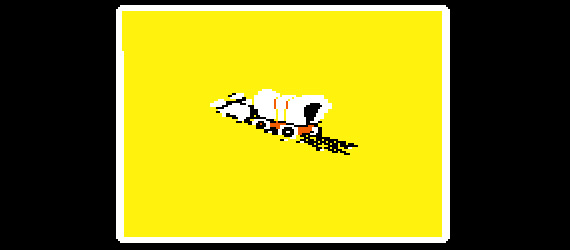My father emailed my brother and I to tell us he witnessed a “great dogfight” between two birds: “It was a draw. Good outcome.” He probably meant that killing isn’t good. I want to say that he can’t mean that violence isn’t good, because he obviously enjoyed the fight, but then I would be saying witnessing something outside of your control and enjoying it is the same as thinking it’s good.
If he witnessed a fight between two people, I wouldn’t hesitate to agree with his conclusion that nobody dying was a good outcome, but because nature is talked about as a domain in which there are no ethics, his judgement feels out of place. His story of seeing the birds fight is in the form of a nature documentary: he’s titilated by the violence between animals, feeling, in a container, the supposed reality beneath the manners of human society.
On the other hand, my gut reaction was to think of all relations as dogfights, so that a draw would be an impasse: the persistance of an antagonism. His email, for example, has produced a draw among my thoughts. The story was so succinct and simple that the idea of a draw seemed to me to have no limit of context. It bloated and bloated, like beached marine life, or a beloved face.
During the last straightforwardly romantic relationship I was in, I visited a friend in a city for a week, which was at that time the longest we had ever been apart. In a used bookstore there, the owner and employees were griping about how many people come in to browse and then buy the books they want for better prices on Amazon. The threat of being the loser of a competition attuned them bitterly to tiny betrayals, to the texture of their loss. Feeling from their conversation that if I didn’t buy something I was a bad person, I bought new edition of The Art of War, with one of those return-to-modernism cover designs. We were in the habit of emailing each other passages, even though doing so mostly made obvious our mutual unintelligibility, and I sent this:
Ground where mere survival
Requires
A desperate struggle
Where without
A desperate struggle
We perish
That is
Death ground.
When there is no way out,
You are on
Death terrain.
On death ground,
We demonstrate
The desperateness
Of the situation.
On death ground,
Fight.
“Are you planning to go to war?” was the reply. I’ve probably never been more passive-aggressive in my life. I had heard that this book was beloved by business types, who liked to imagine themselves embattled every day. I found myself reading it as methodology for the internal fight to stay in the relationship, or as advice on extricating myself from the relationship, the latter of which I struggled to convince myself I didn’t want. It’s easy now that it’s long over to see it as fated to end, but at the time I had anything but clarity on which way it ought to go. It was as though the desire to leave came from another person who grew on me, mollusc-like, and if I acknowledged that person enough to have us surgically separated, I wasn’t sure which one would turn out to be me. I was constantly half in panic, blushing and nauseous, and I felt that this cold, white-space-heavy translation of Sun Tzu might be able to calm me. Even though the fight was between staying or leaving, a draw at that time would have meant staying without any resolution of conflict.
For a revolutionary, a draw would be a defeat. We’re always living in a draw which must end. If it’s a bad end, this is called apocalyptic thinking, which has become, in the crowdsourced mass cognitive behavioural therapy that is twitter, one of the thought-distortions that must be avoided if we’re to collectively understand ourselves exactly as we are. From a painstakingly accurate description of the present historical moment, can anything move? I’m afraid of description becoming prescription, a change that makes change impossible. Apparently I’m so afraid of CBT becoming prescription that I’ve barely read anything about it, and thus know almost nothing about it, yet (of course) have an opinion: The management of distortions–or in apocalyptic terms, the clearing away of all distortions–that appears to be its therapeutic aim, seems to me to be judging what is and isn’t distorted based on what is productive, what makes the patient a productive member of society. And the sad truth is I want absolute truth!
I watched a video of an octopus reaching over with its tentacle and tapping a shrimp on the side of its body that faced away from the octopus, so that the shrimp fled into the octopus’s grasp, and, eventually, mouth. Somewhere, I can’t figure out where, I read the word “tentacle” as a metaphor for a concept reaching into your mind and not letting go even after the tentacle has, which now sounds like a very Hegelian and very hentai image of consciousness. That night I dreamt I worked in an octopus processing plant. We the octopus processors were discussing how to market octopus meat, and someone suggested that octopuses are cute, and described an ad with a cute octopus in profile, so that what drew you in was its cartoonishly exaggerated eye. I thought an ad like that wouldn’t work, because with it immediately comes the thought of our work of slaughtering and filleting the cute animal. (But wait, I think now, that thought would only make the animal cuter.) After work we went to the beach, where an octopus was running around playing tricks on us. I was having fun, but not everyone was so thrilled. One of the more serious and security-minded among us took from the octopus all the tools it had stolen from us. He said it was dangerous.
I’ve heard this particular apocalypse called octopia, in which octopuses inerhit the earth. Octopia is what happens if the you are not the one you thought you were, once separated from your asexual reproduction, or if, having worked through all your cognitive distortions, you discover you don’t recognize yourself at all. It’s not this paragraph.


